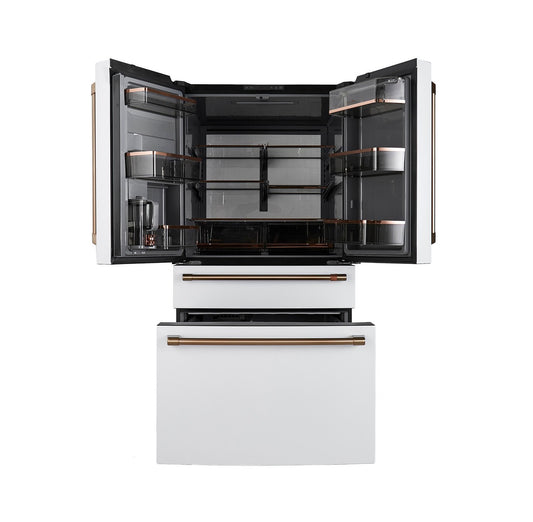Cooking methods have rarely changed throughout history, however cooking technology evolves almost on a daily basis. Now, cooking methods are not the only factor in the decision making process of choosing a gas or an electric burner, but it also includes things like environmental impact, safety, costs, etc. Here are some common similarities and differences between gas and electric burners for your convenience.
Gas Burners
A gas burner is a device that’s used to produce heat by burning natural gas, propane, or butane. These burners are commonly found in gas ranges, gas ovens, and gas grills, and they are also used in industrial and commercial settings for heating and cooking. There are two main types of gas burners: natural draft and forced draft. Natural draft burners rely on the natural flow of air to provide oxygen for the flame, while forced draft burners use a fan to force air into the burner and provide oxygen for the flame. Natural draft burners are typically less efficient and more difficult to control than forced draft burners, which is why they are less commonly used.
When a gas burner is ignited, the gas is mixed with air and ignited by a spark or a pilot light. The heat from the flame is then transferred to the surrounding area, either through conduction, convection, or radiation. Gas burners are typically very efficient at producing heat, as they have a high energy conversion rate and can produce a lot of heat in a short amount of time. One of the main advantages of gas burners is their convenient usage. Gas is easily accessible and can be delivered directly to the burner, which makes it easy to use and maintain. Gas burners are also generally more efficient than electric burners, as they do not waste energy by generating excess heat.

However, there are some drawbacks to using gas burners. One of the main concerns is the risk of gas leaks, which can be dangerous if not properly addressed. Gas burners also produce carbon monoxide, a colorless and odorless gas that can be harmful if inhaled in large quantities. To prevent carbon monoxide poisoning, it's important to ensure that gas burners are properly vented and that carbon monoxide detectors are installed in the home. Another disadvantage of gas burners is that they are not as environmentally friendly as other types of heat sources. Burning natural gas releases carbon dioxide, a greenhouse gas that contributes to climate change. However, natural gas is generally considered to be a cleaner burning fuel than other fossil fuels, such as coal and oil.
Finally, gas burners are a convenient and efficient way to produce heat and are commonly found in a variety of appliances, including cooking, heating, and industrial processes. While there are some risks associated with using gas burners, such as the risk of gas leaks and the production of carbon monoxide, these risks can be mitigated through proper installation and maintenance. Overall, gas burners are a valuable tool for generating heat and can be a useful addition to any home or commercial setting.
Electric Burners
Electric burners are a convenient and efficient way to cook a variety of dishes in your kitchen. These appliances use electricity to generate heat, allowing you to cook without the need for a gas line or open flame. Electric burners come in a range of sizes, styles, and prices to fit your specific cooking needs.
One of the main benefits of using an electric burner is safety. Since there is no open flame, there is a reduced risk of fire or injury. This makes electric burners a great option for those who live in apartments or other small spaces where a gas line may not be available. Besides being safe, electric burners are also very easy to use. Most models have simple temperature controls that allow you to adjust the heat as needed for your recipe. Some models even have built-in timers and automatic shut-off features for added convenience. Another advantage of electric burners is their versatility. You can use them to cook a wide range of dishes, from boiling water for pasta to frying eggs to simmering sauces. Many electric burners also come with multiple burners, allowing you to cook multiple dishes at once. One potential downside to electric burners is that they can be slower to heat up compared to gas burners. However, this can be mitigated by using a high-quality electric burner with a strong heating element. Some electric burners come with features like rapid heat technology that help to speed up the cooking process.

When shopping for an electric burner, there are a few key factors to consider. First, consider the size and style of the burner. Do you need a single burner for small, occasional cooking tasks, or do you need a larger model with multiple burners for more frequent cooking? Next, consider the material of the burner. Some models are made of ceramic or glass, which can be more fragile but offer a sleek and modern look. Others are made of stainless steel or cast iron, which are more durable but may be more difficult to clean.
Another important factor to consider is the price. Determine your budget and look for a burner that meets your needs within that range.
Therefore, electric burners are a convenient and efficient way to cook a variety of dishes in your kitchen. With their safety, ease of use, versatility, and wide range of options, they are a great choice for anyone looking to upgrade their cooking setup.
Induction Burners
Induction burners are a type of cooking appliance that uses electromagnetic induction to heat pots and pans. They are becoming increasingly popular because they are energy efficient, fast, and easy to use.

The biggest advantage of induction burners is their speed. Because they heat the pot or pan directly, rather than relying on a gas flame or electric heating element, they can bring water to a boil much faster than a traditional cooktop. This can be a major time-saver for busy home cooks or professional chefs. Another advantage of induction burners is their energy efficiency. They use less energy than gas or electric cooktops because they don't waste heat by heating the surrounding air. This means they are better for the environment and can save you money on your energy bills. Induction burners are also easy to use and maintain. They have precise temperature control, so you can easily adjust the heat to your specific cooking needs. Since they don't produce open flames, they are safer to use than gas cooktops. One thing to consider with induction burners is that they require pots and pans made of ferromagnetic materials, such as stainless steel or cast iron, in order to work properly. This may require you to purchase new cookware if your current set is not compatible
If you've already made a decision in choosing your cooktop, or still need some answers to your questions, feel free to reach out to us at Townappliance.com. We have a highly professional staff with decades of experience in the appliance industry, and we can also offer you a huge variety of high-end cooktops for sale by the most high-end brands.








